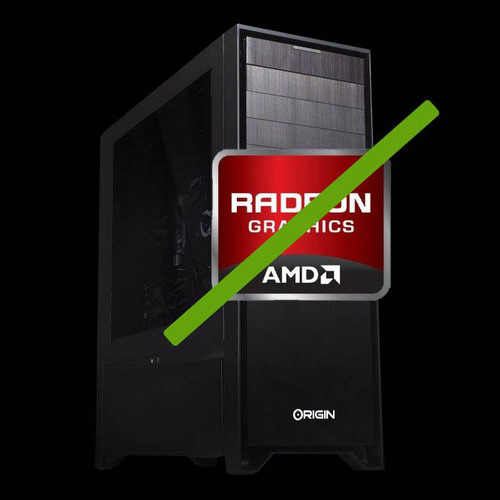A poca distanza dall'annuncio delle nuova serie di GPU AMD R7 e R9 "Hawaii", l'azienda si trova a dover gestire una bella gatta da pelare in termini di percezione da parte del potenziale parco clienti. Il system integrator nord americano Origin PC ha deciso di "bannare" dai suoi computer gaming le schede Radeon in favore delle soluzioni della rivale NVIDIA.
Le motivazioni, secondo Kevin Wasielewski, CEO di Origin PC, sarebbero da ricercare nei feedback negativi forniti dai propri clienti che vedrebbero nelle configurazioni basate sulle schede di casa AMD soluzioni non così prestanti e poco stabili: ”This decision was based on a combination of many factors including customer experiences, GPU performance/drivers/stability, and requests from our support staff. Based on our 15+ years of experience building and selling award winning high-performance PCs, we strongly feel the best PC gaming experience is on Nvidia GPUs.”
Le affermazioni di Wasielewski non mancano di sollevare qualche dubbio. L'azienda continua a vendere sistemi con CPU AMD al posto di quelle Intel, nonostante le prime non siano in grado di raggiungere le prestazioni delle seconde (ricordiamo che i sistemi di Origin PC sono soluzioni molto performanti basate su CPU e GPU high-end magari anche in configurazione multi-VGA) e, allo stesso tempo, le recenti schede grafiche AMD non hanno nulla da invidiare a quelle NVIDIA.
Ma allora potrebbe esserci qualcos'altro sotto? Qualcuno, come l'analista Jon Peddie, afferma che NVIDIA avrebbe potuto elargire qualche dollaro alla causa del marketing, e ad Origin PC, perché avesse un occhio di riguardo per i prodotti verdi: ”It certainly sounds feasible,” dice Jon Peddie che, seppure senza alcuna prova concreta, aggiunge: “Nvidia, AMD, Intel, VIA Technologies—back when they were in the game—they’ve all done things like that from time to time.”
Ovviamente NVIDIA, per bocca del PR manager Brian Burke, nega qualunque coinvolgimento.
Kevin Wasielewski cerca di spiegare meglio la situazione, riportando alcune impressioni del manager del supporto tecnico, Alvaro Masis: “Primarily the overall issues have been stability of the [AMD] cards, overheating, performance, scaling, and the amount of time to receive new drivers on both desktop and mobile GPUs.”
E poi, il co-fondatore di Origin PC, Richard Cary aggiunge alcuni dettagli interessanti:
"The decision to take AMD GPU’s off the web was made based on support. More Specifically, support from AMD to Origin, and Origin to our customers.
Take their last chipset announcement for example. It was another hardware representative that informed us of the new Hawaii chipset. AMD never told us anything about it, nor shared a road map outlining its future integration. When we did get with our AMD representative, we were told that there was a new chipset launching, and we could watch the event live and get answers to our questions.
We also asked for samples to start our research and development process, something that is standard in the industry for bleeding edge integrators, and we were met with resistance there... When they did agree to send samples it was for [two] R9 270’s, rather than the R9 280's or 290's that we would be more likely to offer...
Moreover, this wasn’t the first time AMD had done something like this to us. Support from AMD to Origin hasn’t been where it should be or up to par like we get from other vendors. In my opinion it's due to our size. We don’t move enough AMD product for them to worry about us. You would think they would work with us to help grow the Origin-AMD business relationship."
In queste ultime parole ci ritroviamo anche noi: organizzazione poco chiara, supporto latente e sample inviati per le prove che non arrivano mai nei tempi promessi. Non crediamo molto, invece, ai discorsi sulla poco stabilità o sulla mancanza di performance.

